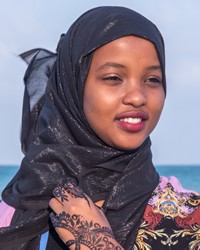Somali, Issa in Djibouti

Photo Source:
Copyrighted © 2026
MarosMatousek - Shutterstock All rights reserved. Used with permission |
Send Joshua Project a map of this people group.
|
| People Name: | Somali, Issa |
| Country: | Djibouti |
| 10/40 Window: | Yes |
| Population: | 666,000 |
| World Population: | 28,900,200 |
| Primary Language: | Somali |
| Primary Religion: | Islam |
| Christian Adherents: | 0.68 % |
| Evangelicals: | 0.08 % |
| Scripture: | Complete Bible |
| Ministry Resources: | Yes |
| Jesus Film: | Yes |
| Audio Recordings: | Yes |
| People Cluster: | Somali |
| Affinity Bloc: | Horn of Africa Peoples |
| Progress Level: |
|
Introduction / History
Several million Somalis live scattered across eight countries in the northeastern portion of Africa and the Middle East. They are one of the most homogenous people groups in Africa, speaking a common language, adhering to a single faith and sharing a cultural heritage. Somalis first appeared in Africa around 1200 A.D. and began expanding westward and southward about 150 years later. They converted to Islam around 1550, under the influence of Arab traders. Today, the Issa branch of the Somali represent the largest ethnic group in Djibouti and make up nearly one half of the country's total population.
In 1884, the territory was occupied by France and given the name "French Somaliland." It was not until 1979 before they regained their independence. Bordered by Ethiopia and Somalia, Djibouti has been greatly affected by tensions between the two countries. Refugees from both Ethiopia and Somalia have fled to Djibouti since 1975. Djibouti lies on the western shore of Bab-el-Mandeb, which is Arabic for "gate of tears."
What Are Their Lives Like?
One-fourth of the Somalis in Djibouti have continued living as nomadic shepherds, even though less than one-tenth of the land is suitable for grazing their cattle, sheep and goats. Scorching heat, scarcity of water, and a shortage of grazing lands make life difficult for Somali nomads; however, poverty and a huge unemployment rate plague those in the cities. Somalis are usually characterized as being very individualistic; scornful of danger, hunger, or thirst; and constantly involved in blood feuds with other tribes and peoples. They speak the Somali language, although the official language of Djibouti is French. Nomads generally dwell in branch-framed, portable huts. They are covered with woven mats or boiled bark that has been pulled into fine strands and plaited. These may be carried from place to place on camels.
The basic building block of Somali society is the family. Each man has the right to be married to four women. The divorce rate is high. The mother raises the children, although the father takes part in their religious training. They strongly emphasize respect for one's elders.
What Are Their Beliefs?
Issa Somalis in Djibouti are Sunni Muslims, and their faith is an integral part of daily life. In the cities, there are groups inspired by the Egyptian Muslim Brotherhood establishing a more orthodox form of Islam and criticizing the Djibouti government for its lack of moral standards. Somalis in Djibouti often seek out religious experts (wadaads) for blessings, charms or advice in worldly matters. These people depend upon good works to pay the penalty for their sins. Somalis depend upon the spirit world for their daily needs because they regard Allah as too distant. They believe that Allah may determine their eternal salvation, but the spirits determine how well they live in their daily lives. Consequently, they must appease the spirits. They often use charms and amulets to help them with spiritual forces.
What Are Their Needs?
Life is difficult for both the city-dwellers and Somali nomads. Poor living conditions, a depressed economy, drought, malnutrition and disease are among the problems the people face day after day. Educational opportunities are also extremely limited, with only one-tenth of school-age children receiving any education at all. There are no universities, and only about one-third of Somali adults in Djibouti can read.
The greatest need of this people group is to hear and embrace the infinite love of Almighty God who has paid the penalty of all their sins. They need to be set free from fear and domination of evil spirits that dominate their lives. Who will reach out to the Somalis in Djibouti?
Prayer Points
Ask Lord Jesus to raise up believing teachers who will work among Somalis and share Christ's love with them. Ask God to grant favor and wisdom to anyone focusing on the Somali. Pray for effectiveness of the JESUS Film, Christian radio and TV among them. Ask the Lord to raise up strong, reproducing church plants and disciple making movements among the Somali people in Djibouti.